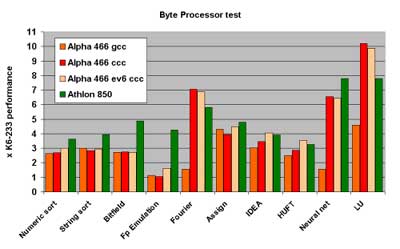Tachyon meldt dat ze bij Ace's Hardware een leuke vergelijking hebben gemaakt, ze vergelijken de 850MHz Athlon met een 466MHz Alpha 21264. De Athlon heeft bijna de dubbele hoeveelheid aan megaherzjes maar is net iets sneller dan de Alpha. Dat is op zich wel aardig goed, maar met een stapel optimalisaties in de compiler wist de Alpha CPU de Athlon in elke floating point benchmark te verslaan ![]() :
:
The biggest difference between the Alpha and the powerhouses from AMD and Intel is the fact that the Alpha is a RISC chip. Now, internally the Athlon and PIII share many properties of RISC design philosophy, but one of the biggest advantage of a real RISC chip is the sheer amount of general purpose registers (GPRs) that the compiler can use. The Alpha has 32 integer and 32 floating point registers available for the compiler. This is in comparison to the 8 registers permitted by x86. Another 48 Integer and 40 floating-point rename registers can be used by the scheduler to avoid resource conflicts. We will show you why so much "compiler available" registers are important.
[...] I know, the Alpha DS10 is targeted at the low-end webserver market, and is a very decent number cruncher for technical and scientific applications, but if the price of the Alpha DS10 would come down a bit, and Compaq offers a faster Alpha processor in this system (say a 500-575 MHz), the Alpha DS10 could compete in the desktop Linux market. Failing this, the faster processor would surely make the Alpha DS10 incredibly popular for applications where crunching power is important, when you consider that the 21264 466MHz can outperform the best x86 processors today. To justify the price premium, Compaq should offer a faster processor. It would be a pity if this beautiful architecture would die, as we are convinced that we need more diversity on the market. The Linux community, Samsung, and Compaq can make sure that there is an alternative (besides Sun and Solaris, of course) to Intel and Microsoft.

